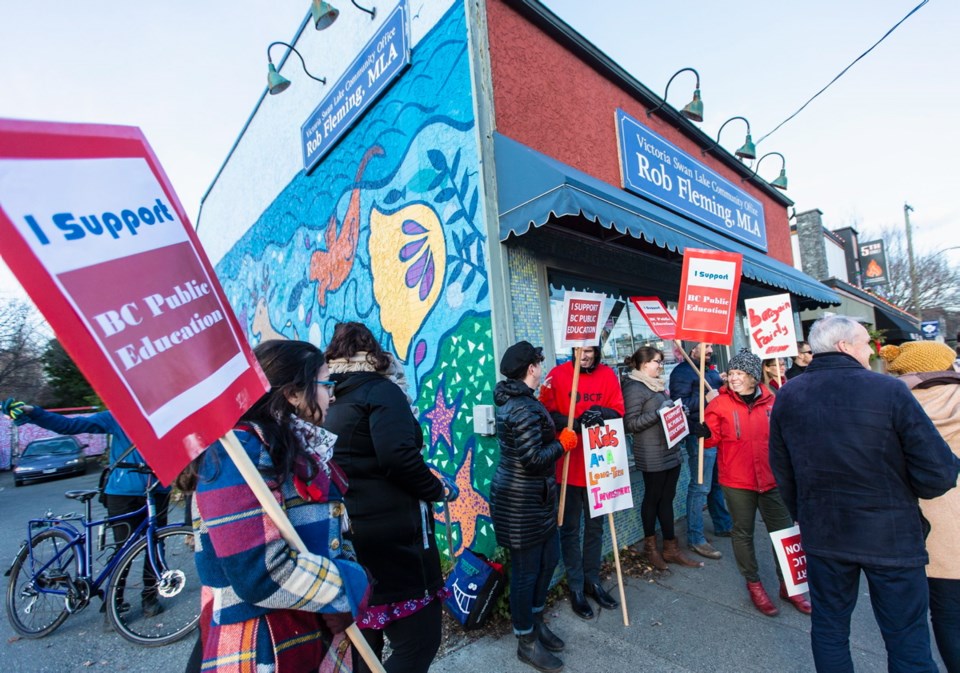Geoff Johnson is a former superintendent of schools.
As the next round of what seems to have become an endless series of teacher contract negotiations begins, some pundits are already honing their long-held predispositions about who and what teachers are. “They’re just in it for the money, the holidays, the hours” are the common tropes.
Nonetheless, the customary resurrection of the cheap shots that inevitably seem to reappear at teacher contract negotiations was enough to cause me to look back and ask myself why I became a teacher in the first place — why does anybody become a teacher, for that matter?
It wasn’t the promise of big money, and even today if you ask 10 teachers how much they actually earn, nine of them couldn’t give you an exact figure. I knew at the outset that teaching was not going to make me wealthy.
Was it the holidays or what appeared to be the hours of work? In all honesty, I never gave that a thought, either.
What about the research that says people become teachers because they want to make difference, or they enjoy working with kids?
At the beginning I couldn’t lay claim to either of those motivations, as noble as they are.
I’d had several brilliant teachers, one in elementary school, one in secondary school and, surprisingly, two in post-grad who inspired me. Maybe that was part of it.
I admired these teachers, what they did and the skill with which they did it. They excited me about learning generally, and specifically about delving deeper into the stuff they were teaching.
I always left their classrooms pleased that I apparently knew more than I had thought.
Since that time, I’ve had the opportunity to observe classroom magicians who make me proud to be part of the profession, but also realize that at my best I was never that good, that stimulating, that technically excellent as the best in the profession could be.
And yes, in school and since then I’ve come across a few teachers for whom teaching is not a good fit. That’s reality, and it’s inevitable when people stay in any job long after they know, in all good conscience, that this job really isn’t for them.
So why be a teacher? Why take the risk when you don’t really understand the complexities of teaching and learning? You know that somewhere along the line even you yourself had a poor teacher out of the 30 or 40 you came across K-12 and, in the minds of some, that poor teacher will define you as a teacher and your profession generally.
Like most newbie teachers, it took me a while to discover if I actually on the way to becoming a good teacher.
Some of my own professional education came not from university courses, but had to do with classes I taught during teacher training — I learned a lot from them, including that kids are smart and have a wonderful sense of humour.
There was the student practicum class of Grade 11 boys at a tony public secondary school to whom I explained that my university supervisor was coming the next day and I hoped (meaningful pause here) that things would “go well.”
“No problem, sir — we’ve got it covered.”
“Uh oh — meaning what?”
“Well sir, when you ask a question, if we know the answer, we’ll put up a right hand and if we don’t, a left hand — don’t ask the lefties, but whatever happens, you’ll get a sea of response.”
Classroom teaching and learning was not me versus them — we were in it together.
Simply seeing a student move from a lack of interest to being willing to respond in class, openly sharing thoughts and opinions — for me those were the epiphanic moments when I hoped beyond hope that maybe I might become a teacher after all.
Just as a jazz or classical musician needs to become completely comfortable with scales and modes of scales, the best teachers have access to and an extensive body of specialized knowledge gained not through university courses, but by the patient practice of the profession, every day, every class. Creativity only comes after that.
So let’s take it easy and not allow contract negotiations between government, its proxy negotiators and teachers to descend, as they have too often in the past, into vituperative back and forth accusations — the health of public education is much more important than that.
Oh — and just this once, a special request — any chance we could keep the kids in school while the adults go somewhere and hash out a contract?



